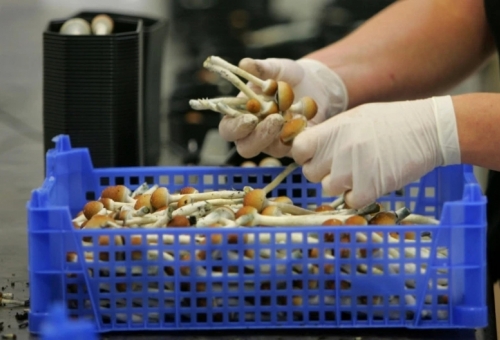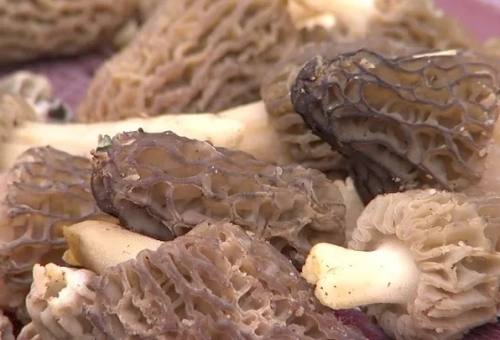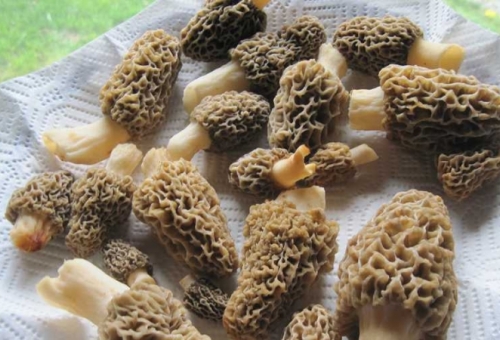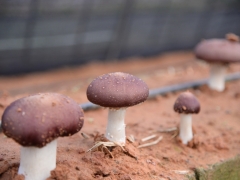Along with ducks, another set of organisms should be overjoyed at all the rain we’ve been getting. I refer to mushrooms, now appearing after a month in which almost nine inches of rain fell. But mushrooms are not materializing out of thin air; they are the fleeting reproductive bodies of fungi that have already threaded themselves unseen through rotting wood and the biosphere of the soil.
Like flowers, which are also fleeting reproductive bodies, mushrooms have beguiled us through the ages. This relationship goes deep in our own strands – of DNA – because we know at some profound level that fungi can feed us, sicken us, heal us, play with the mind and even kill us. It pays to know your mushrooms.
I’m no guru, so I asked mycologist Jared Urchek to take a walk through the woods to see how much the recent deluges had precipitated, so to speak, a mushroom bonanza after months of dryness.
We agreed to meet at the National Arboretum in Washington, and when I first eyed Urchek I knew I had found someone at home in sylvan mushroom environments. Urchek, 30 and bearded, looked as if he could traverse the Appalachian Trail before breakfast.
We made first for Mount Hamilton, the arboretum’s high point where azaleas decorate the forest floor. Before entering, Urchek stopped to identify the trees, which flag symbiotic fungi species. “Earlier, with morels, I was looking for tulip poplars,” he said, scanning the treetops. “This looks fairly good, white oak and mixed hardwoods.”
Cut logs are used to edge the trails, and I could see Urchek searching them for mushrooms. Almost immediately, he found one with fine-textured fungi sprouting vertically in tight, parallel columns, each one topped with a tiny crown. “We call them coral mushrooms,” he said, taking a closer look. He took a field guide from his bag and narrowed it down to two species, leaning toward one named Clavicorona pyxidata. “It’s edible, yeah. If it’s this one,” he said, laughing.
Farther up the hillside, we discovered a stump with two kinds of bracket fungi growing on it. The larger was dry and pale, and from last year. “It’s a multicolor gilled polypore,” he said. “Colorful when fresh. No one around here uses it, but it’s a Chinese herb,” he said.
In a nearby path of wood chips, we came across a single clump of tan-colored mushrooms. Mycologists call these “little brown mushrooms,” until they can study them closely to figure out what they are. This includes looking at whether the gills connect directly with the stem, and what color they turn when bruised. “I could spend some time trying to identify this if I wanted to be frustrated,” he said.
Through the woods, we found a road with a barrier and a sign that announced the presence of nesting bald eagles, and invited us to turn back. We headed to the arboretum’s native plant woodland, Fern Valley. At the base of a beech tree, a tiny, lone mushroom resembled a ribbed parasol. “This is fairly common,” Urchek said. “Marasmius.”
But I wanted to know: Why wasn’t the whole forest floor bedecked with mushrooms after a month of unceasing rain? Urchek said the rain helps with fruiting, but mushroom appearance is affected by other factors. Morels, for example, appear once soil temperatures reach about 50 degrees for a week, but the season ended in mid-May. Other fungi, which live in partnership with tree roots, are waiting for all the sugars generated by the spring leaf-out to find their ways down to the root zones.
“With all the rain, you’d think everything would be exploding, but it’s not quite the right season,” he said.
No matter.
For Urchek, mushroom hunting connects him to his ancestors, who knew the bounties of the forest in West Virginia and, earlier, Central Europe.
In my two hours with him, he did not pull out his smartphone once. He doesn’t reject contemporary digital society, but he laments the way it further removes us from the natural world.
























